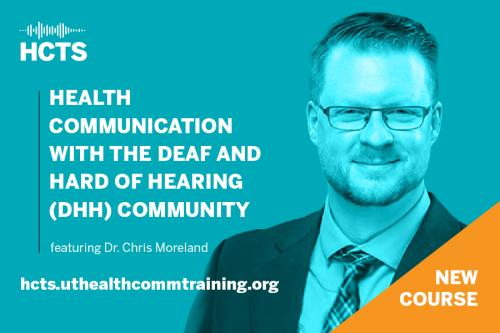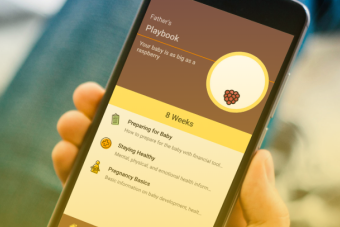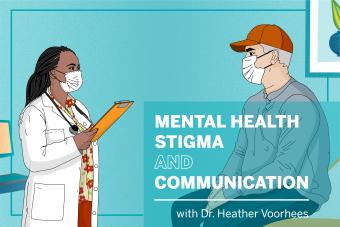
Accessible Health Communication for All
Every physician and healthcare provider will work with a person who is Deaf or Hard of Hearing at some point in their career. The CHC's news Health Communication Training Series course, Health Communication with the Deaf and Hard of Hearing (DHH) Community explores health disparities affecting the DHH community and ways to help bridge those gaps and equips you with tools, strategies, and knowledge needed to effectively communicate with Deaf and Hard of Hearing patients that you work with now and will work with in the future.

Father’s Playbook App: The Payoff of a Long-term Health Communication Research Program

Health Communication Training Series Launches First Module
The CHC's online education program, the Health Communication Training Series, has officially launched its first module, Mental Health, Stigma, and Communication. This free, self-paced module aims to highlight the importance of communicating effectively about mental health and the impact mental health stigma and communication have on the patient-provider relationship.
January 2024 News

CHC Welcomes Administrative Assistant: Jennifer Graham
We are excited to announce that Jennifer Graham has joined the CHC as an Administrative Assistant, effective January 2.
September 2023 News

CHC Welcomes Research Associate: Lindsay Bouchacourt, Ph.D.
We are excited to announce that Lindsay Bouchacourt, Ph.D. has joined the CHC as a Research Associate, effective September 18.
June 2023

Equity Science, Health Equity, and Big Data course launch
HCTS has launched the Equity Science, Health Equity, and Big Data course. This course explores the definition of equity science and how it plays a vital role in health communication research and practice to help achieve health equity for all.
February 2023 News

CHER Grant Program awards sixth cycle grantees
The CHER Grant Program has named the recipients for the 2022-2023 funding cycle.
November 2022 News

CHC Welcomes Program Coordinator: Laura Anaya Rodriguez
We are excited to announce that Laura Anaya Rodriguez has joined the CHC as a Program Coordinator effective November 28.

CHC Welcomes Sr. Program Coordinator: Lauren Kriss
We are excited to announce that Lauren Kriss has joined the CHC as a Sr. Program Coordinator effective November 7.

Pain, Opioids, and Hard Conversations course launch
The newest HCTS course, Pain, Opioids, and Hard Conversations, is open for enrollment. This course focuses on helping providers have effective communication with patients around pain and opioids.

Disparities, Equity, and Health Communication course launch
The Health Communication Training Series has launched the Disparities, Equity, and Health Communication course. This course discusses the role health equity and communication play in the quality of healthcare outcomes and addressing health and racial disparities among communities of color.
October 2022 News

CHC Welcomes Research Associate: Charulata Ghosh
We are excited to announce that Charulata Ghosh has joined the CHC as a Research Associate effective October 19.
September 2022 News

CHC Welcomes Sr. Program Coordinator: Anna LoSecco
We are excited to announce that Anna LoSecco has joined the CHC as a Sr. Program Coordinator effective September 1.
August 2022 News

Registration Open for HCSP Grant Writing Workshop
The 2022 Health Communication Scholars Program Grant Writing Workshop will take place on Friday, October 21, 2022, from 9-1 p.m.

CHC Welcomes Sr. Program Coordinator: Lara O'Toole
We are excited to announce Lara O'Toole has joined the CHC as a Sr. Program Coordinator effective August 8.
July 2022 News

Health Literacy and Clear Health Communication course launch
The newest Health Communication Training Series course, Health Literacy and Clear Health Communication is open for enrollment. This course discusses the basics of health literacy, explores assessment tools, and identifies the right tools and strategies to apply to meet your clients' unique health communication needs.
April 2022 News

CHC Welcomes Graphic Designer: Ellen Shin
We are excited to announce Ellen Shin has joined the CHC as a Graphic Designer, effective April 25.
February 2022 News

CHC Welcomes Sr. Graphic Designer: Asha Thompson
We are excited to announce Asha Thompson has joined the CHC as a Sr. Graphic Designer, effective February 1.
January 2022 News

CHC Welcomes Graphic Designer: Natalie Tarrant
We are excited to announce Natalie Tarrant has joined the CHC as a Graphic Designer, effective January 18.
December 2021 News

CHC Welcomes Sr. Program Coordinator: Jeremy Martin
We are excited to announce Jeremy Martin has joined the CHC as a Sr. Program Coordinator, effective December 6.
November 2021 News

CHC Welcomes Copywriter: Lauren Pezzullo
We are excited to announce Lauren Pezzullo has joined the CHC as a Copywriter, effective November 29.

CHC Welcomes Creative Director: Chris Beeler
We are excited to announce Chris Beeler has joined the CHC as a Creative Director, effective November 22.

CHC Welcomes Program Coordinator: Kaitlin Berns
We are excited to announce Kaitlin Berns has joined the CHC as a Program Coordinator, effective November 3.

CHC Welcomes Research Associate: Olubunmi Obayemi
We are excited to announce Olubunmi Obayemi has joined the CHC as a Research Associate, effective November 1.
October 2021

CHC Welcomes Research Associate: Weijia Shi
We are excited to announce Weijia Shi has joined the CHC as a Research Associate, effective October 25.

CHC Welcomes Father's Playbook Research Associate: Catherine Cunningham
We're excited to announce Catherine Cunningham has joined the CHC as a Research Associate for the Father's Playbook project effective October 4.

CHC Welcomes Program Manager: Melanie Susswein
We're excited to announce Melanie Susswein has joined the CHC as a Program Manager effective October 1.
September 2021

CHC Welcomes Event Coordinator Intern: Alyssa Daniell
We're excited to announce Alyssa Daniell has joined the CHC as an Event Coordinator Intern effective September 20.
August 2021

CHC Welcomes Sr. Program Coordinator: Paloma Gray
We are excited to announce Paloma Gray has joined the CHC as a Sr. Program Coordinator for Whole Communities Whole Health, effective August 9.
July 2021

CHC Welcomes Program Coordinator: Eileen Artigas
We are excited to announce Eileen Artigas has joined the CHC as a Program Coordinator for Father's Playbook, effective July 26.
January 2021
CHC Welcomes Online Education Program Manager: Komal Gandhi
We are excited to announce Komal Gandhi has joined the CHC as an Online Education Program Manager, effective January 4.

CHC Welcomes Graphic Designer: Shayna Brewer
We are excited to announce Shayna Brewer has joined the CHC as a Graphic Designer, effective January 4.
June 2020

Free Resources Available to Help Change the Conversation About Mental Health Diagnoses
With support from the Hogg Foundation for Mental Health, a team at the UT Center for Health Communication has created a whitepaper and curriculum modules—all available to the public for free—around one important question: What are the best ways to train healthcare professionals and journalists about mental health and mental illness communication... and why should we?
May 2020

CHC Welcomes Postdoctoral Fellow: Billy Table
We are excited to announce Billy Table has joined the CHC as a Postdoctoral Fellow, effective May 1.
January 2020

CHC Welcomes Web Developer: Eddie Silva
We are excited to announce Eddie Silva has joined the CHC as a Web Developer, effective January 27.
CHC Welcomes Program Coordinator: Zach Cohen-Ford
We are excited to announce Zach Cohen-Ford has joined the CHC as a Program Coordinator, effective January 6.
December 2019

CHC Welcomes Copywriter: Nick Brothers
We are excited to announce Nick Brothers has joined the CHC as a Copywriter, effective December 9.

CHC Welcomes Program Coordinator: Ryann Freeman
We are excited to announce Ryann Freeman has joined the CHC as a Program Coordinator, effective December 9.
October 2019

CHC Welcomes Graphic Designer: Merina Karpen
We are excited to announce that Merina Karpen has joined the CHC as a Graphic Designer, effective October 22.

CHC Welcomes Graphic Designer: Nicole Kirschten
We are excited to announce that Nicole Kirschten has joined the CHC as a Graphic Designer, effective October 21.

CHC to Synthesize Major Issues and Best Practices Regarding Mental Health-Related Communication
Thanks to a grant from the Hogg Foundation for Mental Health, the Center for Health Communication (CHC) at The University of Texas at Austin has begun production on a whitepaper meant to advance the American conversation about mental health.
September 2019 News

CHC Welcomes Postdoctoral Fellow: Heather Voorhees
We are excited to announce that Heather Voorhees has joined the CHC as a Doctoral Fellow, effective September 3.
June 2019 News

CHC Welcomes Administrative Assistant-Event Manager: Breanna Deal
We are excited to announce that Breanna Deal has joined the CHC as a Administrative Assistant-Event Manager, effective June 10.
May 2019

CHC Welcomes Program Coordinator: Mike García
We are excited to announce that Mike García has joined the CHC as a Program Coordinator, effective May 29.


